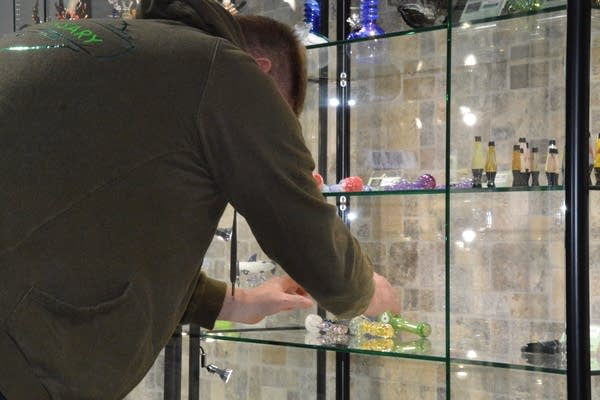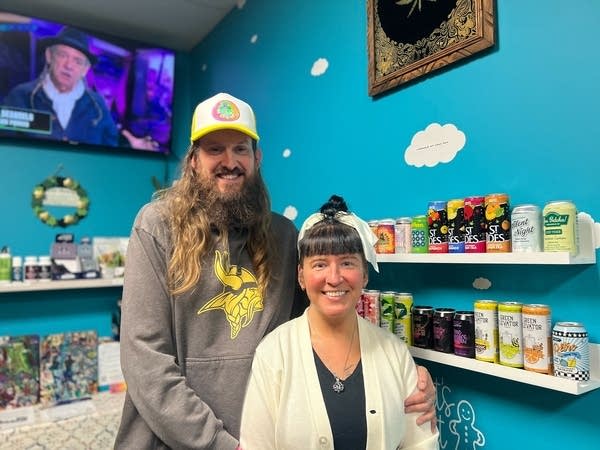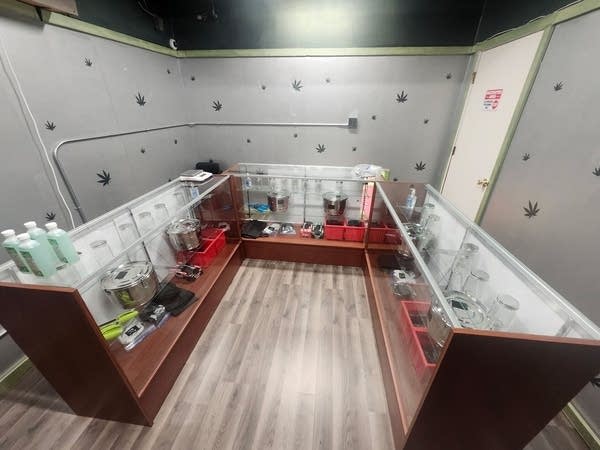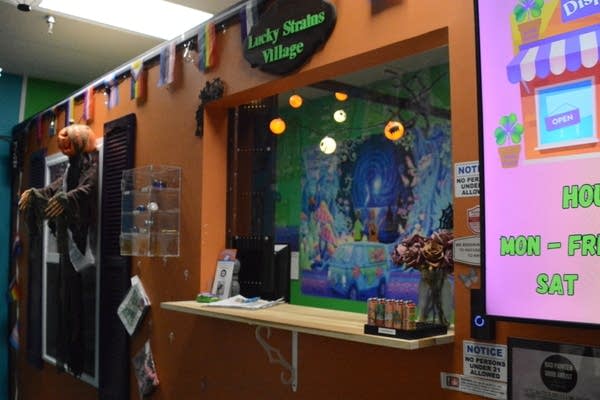Mark Eide is struggling to keep the lights on at his downtown Minneapolis dispensary.
For the past three years, he’s been selling low-potency hemp products at his store, In-Dispensary. Now, with a cannabis retail license in hand, he’s transitioning into selling recreational cannabis.
The only problem is there’s no product to sell.
“All day long I take phone calls from people to tell them no, we don't have the product,” said Eide, who got his license on Aug. 12. “Then they want to know when I’m going to have the product and I have no clue.”
His dispensary was the first retail microbusiness to get licensed in Minneapolis. Eide is one of 40 licensed dispensaries who are waiting for more supply to be available — either from cultivators who need more time to grow or from the few who have product they’re willing to sell.

Minnesota is still in its early stages of recreational cannabis rollout, which means supply is few and far between. For Eide, that may mean closing up shop before being able to sell recreational cannabis.
He’s already had to let go of two employees, including his brother, to keep his doors open.
“It's been very, very tough, and we've even had to look at exit strategies,” he said.
‘We just don’t know who to call’: Cannabis business owners frustrated with supply bottlenecks
As of Thursday morning, 61 businesses have cannabis licenses. Here’s a breakdown of them:
-
One is a large-scale retailer;
-
One is a mezzobusiness, which can grow, manufacture and sell cannabis at a larger scale than microbusinesses;
-
Two are large-scale cultivators;
-
Two are testing facilities;
-
Two are medical-combination cannabis operations;
-
And 53 are microbusinesses, which have the ability to grow, manufacture and sell cannabis. Of the microbusiness licenses, 40 can retail, 11 can cultivate, one can manufacture and one can both manufacture and cultivate.
As of Thursday, there are only four businesses who can supply recreational cannabis: the two tribal nations (White Earth Nation and Mille Lacs Band of Ojibwe) and Minnesota’s two medical cannabis providers (RISE and Green Goods), all of whom can wholesale. Outside of that, dispensaries will have to wait for cultivators to come through with their grows.
“I called everybody,” said Eide. “We knew White Earth had the compact, but we didn't get any phone calls back and that makes sense — they're four hours away from us. Even if they did want to sell to us now, logistically, they got to figure out how to get a delivery down to me.”
White Earth Nation started supplying the first microbusiness selling recreational cannabis, which was Legacy Cannabis in Duluth, on Sep. 16. Zach Wilson, head of White Earth Nation’s tribal cannabis enterprise known as Waabigwan Mashkiki, says the tribe is trying to supply as much as it can, including to its own three dispensaries.
Wilson confirmed White Earth is not wholesaling to any other licensed retailers yet but hopes to supply four to five more shops in the next few weeks.
He notes a challenge in working with non-tribal cannabis stores is setting up Metrc, a technology system required by the state to track cannabis from seed to sale. He says it takes five to seven days to get clear compliance in Metrc before product makes it to shelves.
“It’s the standard for all tribes right now and we need the state to get the instance to instance built with Metrc or it will absolutely stop tribes from doing business with state license holders,” said Wilson.
The Mille Lacs Band of Ojibwe is the second tribal nation to sign a compact agreement with the state, giving it permission to sell cannabis outside its land. The tribe previously told MPR News their 50,000 square foot cultivation facility intends to supply its two dispensaries as well as state-licensed retailers.
Spokesperson Alyssa Enno says Mille Lacs is gearing up to wholesale to dispensaries. The tribe is also working on seed-to-sale compliance tracking with Metrc and anticipates it will begin selling recreational products by the end of this month.
Eide was ecstatic when Mille Lacs completed their compact. They’re closer to his Minneapolis shop and have a large growing facility.
“But we’ve made multiple calls there and we just don’t know who to call,” said Eide.
Sarabear Kelly-Modlin, co-owner of Lucky Strains dispensary in New Brighton, also has not had any luck with finding supply.
“It’s like getting a driver's license, but you have no car to drive,” she said. “I went through cancer and everything the entire time we were going through this, so getting our license was a huge triumph for us personally. But business-wise, nothing has changed,” she said.

Both have not heard back from RISE and Green Goods, which have state permission to convert a third of their inventory to recreational sales and wholesale to other dispensaries. A spokesperson at Chicago-based Green Thumb Industries, the parent company to RISE, confirmed they have not begun wholesaling but “intend to as soon as possible.”
“We are currently bound by the cultivation and manufacturing restraints. These limits make it harder for licensed operators to keep up with growing demand, despite having the infrastructure, expertise and supply to responsibly do so. The state’s cannabis system needs legislative reform that will ensure there will be enough supply to support Minnesota’s adult use customers and newly licensed dispensaries.”
Minnesota limits RISE and Green Goods to cultivate up to 90,000 square feet of plant canopy each. Of that maximum, up to 60,000 square feet can be designated to medical cannabis while up to 30,000 square feet can go toward adult-use cannabis.
Vireo Health, the Minneapolis-based parent company to Green Goods, did not respond to an MPR News request for comment.
Medical dispensaries selling recreational cannabis was ‘nail in the coffin’ for small businesses
Last month, RISE and Green Goods launched adult-use sales at several dispensary locations across the state — expanding access to recreational cannabis in Minnesota.
That blindsided many dispensary owners, who accuse the state’s Office of Cannabis Management (OCM) of making a secret, last-minute deal with the two medical cannabis giants. Eide says it gives them an unfair edge in the market and only hurts small businesses.
“I had no clue,” said Eide. “And I challenge the Office of Cannabis Management to show me any document that would have put anybody on notice that a part of their agreement with the medical MSOs would open them up to be able to do rec sales six blocks away from me.”
According to OCM director Eric Taubel, contracts with Vireo Health and Green Thumb Industries were set to expire March 1 this year. OCM was in negotiations with them and got extensions signed before that deadline.
Taubel says OCM’s priority was making sure medical patients didn’t lose access to cannabis.
The extension contracts included groundwork for how the medical cannabis companies could operate in the recreational cannabis space, including repackaging a portion of their existing supply for adult-use sales.

“We thought that they would have to play by the rules that we played by, but they cut a back room deal with Eric Taubel that none of us knew about that allowed them to just repurpose this old flower rather than start from scratch like we have to,” said Clemon Dabney, a hemp and cannabis business leader who is now pursuing a microbusiness license. Dabney was a finalist for the OCM director position that Taubel now holds.
He and many other microbusinesses say the state promised they would get a head start and have enough time to complete their setup before large medical companies could enter the recreational market.
Cassidy Gow, who has a social-equity license, says Minnesota has broken that promise. She’s angry that medical cannabis shops are selling recreational products.
“In a state that says they don't want corporations to be able to take over — well, you only license two medical facilities for the whole state, so right then and there, there's a problem. And then you're going to grant them the ability to retail before all these people that have been investing in working with OCM for months and months to get a license,” said Gow, owner of Two Harbors Cannabis dispensary.

Taubel says the office mentioned the coming change as part of a news release in July that was sent to all hemp registrants and the agreements are public, although they’re only available by request.
“We didn't think about this as something we were trying to, like, obfuscate or hide. It was very much something we were talking about. It was very much a part of our planned rollout. You know, I'm certainly not naive that I think a number of people were caught off-guard,” Taubel said. “But, you know, the reality for us was that that was part of our continued mission to serve the medical market and ensure patients had uninterrupted access during this transition period.”
A Green Thumb Industries spokesperson said “there was no special agreement,” and instead, “because we have been cultivating, processing and dispensing medical cannabis to patients in the state for several years, we were able to efficiently meet their application requirements.”
Eide says he still hasn’t seen the terms of the agreement between OCM and the medical companies. The same week RISE and Green Goods began selling recreational cannabis, he says sales at his downtown Minneapolis shop tanked by 80 percent.
“That felt like the nail in the coffin,” said Eide, whose shop is a 15-minute walk from a Green Goods dispensary.
Now when customers come into his shop looking for adult-use cannabis, he has to send them to his competitor. Eide says if he knew it would be impossible to get cannabis into his dispensary, he would’ve pursued a different cannabis license to be a transporter.
Gow, who has been in the hemp business for the past two years, says she’s struggling but able to wait until more cannabis is available. She hasn’t heard back from the tribal nations and medical cannabis companies about wholesaling to her dispensary, but estimates she could get cannabis from cultivators she knows as early as January or February.
“Without the ability to actually still be selling nicotine, I don't know that I would have the doors still open right now, if we're being honest,” said Gow.
Even if cultivators have cannabis ready, other gridlocks will delay products hitting shelves
If there were more cultivators growing and ready to harvest their cannabis, dispensary owners still say there aren’t enough businesses set up to bring their product to shelves — as of Thursday, there are just two licensed cannabis-testing facilities and no licensed transporters.
“I’m frustrated and literally it’s turned into disgust,” said Kelly-Modlin. “I just can’t believe that everything has been rolled out so poorly — this is all just terrible.”
She says the state should have licensed cultivators first, then got testing facilities and transporters set up before retail licenses. Two thirds of all licensed cannabis businesses are retailers.
Come Jan. 1, when all hemp products need to get tested in Minnesota, the two licensed testing facilities will be slammed with demand for both cannabis and hemp that will undoubtedly result in backlogs.

“We're like kids in a courtyard. We're fighting over the basketball, to give it to me for getting flower — where we're supposed to be united right now as a cannabis community and helping each other out and lifting each other up to get these products. That's not what the case is right now,” said Kelly-Modlin.
When asked whether OCM was worried about these roadblocks in the cannabis supply chain, Taubel said Minnesota’s regulatory cannabis agency was directed to learn from other states like New York, where licensing from top down resulted in too much supply and not enough retailers.
“The retail licensure process got really tangled up in litigation, which meant you had a ton of cannabis cultivation, of flower and product, with no retail outlet — which is part of how you ended up with the sort of bodega dispensary model in New York, where illegal shops were selling legal cannabis.”
Taubel said OCM’s goal has been to get licenses approved quickly and then let people make business decisions about how and when they open within the given 18-month window.
When will Minnesota’s cannabis market explode?
As of Tuesday, over 1,000 microbusinesses are pre-approved for a license and have not moved to the next step. Taubel says a majority of those are retail operations waiting to open until more cannabis is available. There are also no approved transporter licenses yet, but 29 applicants are pre-approved and Taubel expects some of those licenses to move to market soon.
“My gut is there's a number of people, whether to transport, or whether it's delivery service, or even some of the micros, retailers, or people seeking retail operations, that are holding out a little bit longer to see if more cultivation comes online and more compacts get signed,” he said. “It’s hard to know what will drive businesses to make the decision that it’s time to jump into the market.”

He hesitated to speculate when that will happen or when Minnesota’s cannabis market will start picking up, but guesses it’ll “seem like it happened overnight.”
“We’ll be talking about, ‘When will it happen?’ And then it’ll just sort of have happened,” said Taubel.
Taubel says he also anticipated there would be limited supply at the launch of Minnesota’s cannabis industry. But he’s hopeful with more businesses getting licensed — about five to eight every week — that the market will start to flourish and that there will be more options for microbusiness retailers to get cannabis supply from.
But when will Minnesota’s cannabis industry finally take off? That’s to be determined.



0 Comments